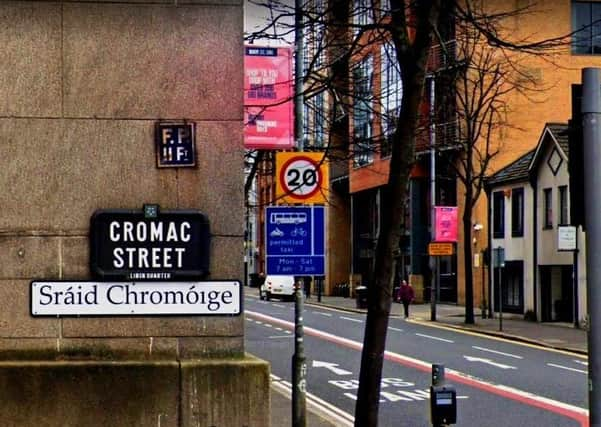New Irish roadsign rules will ‘push minority views on to majority’


A motion was passed by the city council on Thursday night which relaxes the criteria for installing new street signs – with the SDLP and Sinn Fein (plus Alliance and others) swamping unionist opposition to the move, according to DUP man Tom Haire.
Although the News Letter has been told that it applies to any language – from Ulster Scots to Swahili – the concern of unionists is that it will be used by republicans as a “political tool” to vastly increase the number of Irish signs.
Advertisement
Hide AdAdvertisement
Hide AdThe previous policy was that one third of residents, by way of petition, may trigger a formal consultation in relation to the erection of a second nameplate in a language other than English.
If two thirds responded positively, the threshold is deemed to be met.
The policy treated those who do not respond as essentially not in favour.
The new policy basically means that a single resident (or just a councillor) can trigger a petition to have a bilingual sign installed, and that if 15% of the residents are in favour, it can go forward for approval by the council.
Advertisement
Hide AdAdvertisement
Hide AdThe policy change was actually made by the Strategic Policy and Resources committee back in October, but Thursday night’s full council meeting ratified its decision.
Councillor Haire was among those in the chamber during the vote.
“We were happy with the way it was,” he said.
“We think this here is enabling people who are in a minority to push their wishes onto a majority of people living in an area.
“We don’t think it’s as democratic or equal as it should be.
Advertisement
Hide AdAdvertisement
Hide Ad“There’s no money being set aside for it; we’ll just take it as it comes.
“It could be a substantial cost for the city.
“In these times where there are more priority things need to be done, where there’s Covid and all, I think it’s a very minority thing even to take the trouble to worry about – street signs in Irish, or any other language for that matter.”
He said Presbyterians (of which he is one) had been prominent Irish speakers in the past, but that today the language is often viewed as a “political tool” of Sinn Fein.
Sinn Fein councillor Seanna Walsh meanwhile said: “This is a historic day as Belfast City Council has voted to adopt a new bilingual policy which will ensure the visibility of Irish street signage in the city and advance a new, progressive and shared Belfast.
Advertisement
Hide AdAdvertisement
Hide Ad“Belfast has been central to the ongoing growth of the Irish language and Gaelige is part of the fabric of our city as seen with the vibrant Gaeltacht quarter and the growing numbers of unionists now embracing and learning the language.”
TUV north Belfast representative (not a councillor) Ron McDowell meanwhile said: “To impose Irish street signs on an area where 85% of residents oppose such a move is madness. There is nothing inclusive or progressive about imposing on the majority in such a fashion.”
Belfast unionists have long since lost their majority grip on the council.
Today, the split of the 60 councillors is 15 DUP, two PUP, two UUP (19 in all) and 18 SF, six SDLP (26), plus 10 Alliance, three People Before Profit, and four Greens (16).
READ MORE FROM THIS REPORTER:
Advertisement
Hide AdAdvertisement
Hide AdClick here: Trump’s NI envoy quits after Washington DC disorder... describing his job as ‘part time’ and ‘nothing’
A message from the Editor:
Thank you for reading this story on our website. While I have your attention, I also have an important request to make of you.
Advertisement
Hide AdAdvertisement
Hide AdWith the coronavirus lockdown having a major impact on many of our advertisers — and consequently the revenue we receive — we are more reliant than ever on you taking out a digital subscription.
Subscribe to newsletter.co.uk and enjoy unlimited access to the best Northern Ireland and UK news and information online and on our app. With a digital subscription, you can read more than 5 articles, see fewer ads, enjoy faster load times, and get access to exclusive newsletters and content.
Visit https://www.newsletter.co.uk/subscriptions now to sign up.
Our journalism costs money and we rely on advertising, print and digital revenues to help to support them. By supporting us, we are able to support you in providing trusted, fact-checked content for this website.
Alistair Bushe
Editor